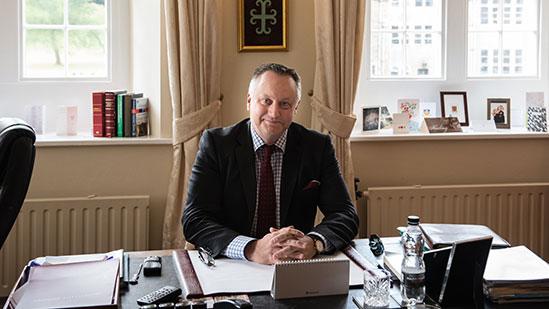On Servant Leadership
by Dr James Whitehead, Headmaster, Downside School
One of the very first acts of Pope Francis’ papacy was to explain his vision of leadership. In his Installation Service homily, the Pope explained his view that “authentic power is service”. In a western world where the idea of serving others may seem demeaning to an individual or even be perceived as a consequence of career failure, the Pope emphasised that it is at the heart of the Christian project. It was a key moment, an indication of the direction his papacy would follow and a strong message to the powerful about authenticity. His message remains urgently relevant.

In schools, we need to articulate a vision of leadership that makes sense to our pupils and staff. It must be a model which they feel they can relate to, but it should also be something which challenges them to the right kind of action.
The Army’s ‘Serve to Lead’ motto is a good one, and some months ago I heard a talk by a Head Teacher of a new academy who had successfully made the CCF system the core of the lived social values of the school; this particular new school contained a predominantly Eastern European immigrant pupil body and it was clearly successful, working according to a sense of shared values. We can achieve the same in Catholic Schools with a clearly articulated vision of Christian Servant Leadership. The trick is to make it seem relevant and authentic to those whom we hope will embrace the project.
In a presentation I give to all staff and pupil prefects at Downside, I start by drawing a comparison between the leadership principles in the Rule of St Benedict and those espoused by Major Richard Winters in his book Beyond Band of Brothers (2006); there is a curious synchronicity between these two very different books, as the philosophy of the Sixth Century Saint and Patron of Europe finds curious echoes in the philosophy of the bible-reading Christian and hero of Easy Company, 101st Airborne Division, whose wartime leadership is portrayed in the HBO television mini-series Band of Brothers. It can be important to catch the attention of colleagues and pupils with something of immediate relevance to them.
There are other diverse characters whom we can point to in terms of leadership characteristics, for example, Nelson Mandela or Aung San Suu Kyi, who reflect a way of operating that can be a useful point of comparison for us. The key thing in choosing an example is that it is relevant to your pupils and staff, whether that is the New Zealand rugby team as portrayed in James Kerr’s Legacy: 15 Lessons in Leadership, What the All Blacks can teach us about the Business of Life (2013), or St Damien of Molokai, as described by Barack Obama, “In our own time as millions around the world suffer from disease, especially the pandemic of HIV/AIDS, we should draw on the example of Fr. Damien’s resolve in answering the urgent call to heal and care for the sick”.
What we need to be clear about, however, is that the model of leadership that we are advocating is one that is rooted very firmly in Gospel Values. As St Benedict puts it in the Rule, “the Abbot or Abbess should give a lead to their disciples by two distinct methods of teaching, by the example of the lives they lead (and that is the most important way) and by the words that they use in their teaching”. Lectio Divina – the practice of reading the bible prayerfully in small groups – provides a source for those words and it is a major strength of the spiritual culture at my own school, Downside.
An emphasis is placed on scriptural engagement for all, while at the same time as seeking the well-being of others: reading the scriptures enables us to see others as they truly are and ourselves too, while also providing an encouragement to us to take practical steps for the benefit of others. Setting up a prayer community in the Sixth Form of pupils who will themselves lead prayer groups with the younger pupils, has had a transformative effect on the spiritual life of our school. Similarly, setting up a Sixth Form Service Community, inspired by the example of St (Mother) Teresa of Calcutta, has had a very special impact on the culture of the school, as senior pupils lead juniors in a way of living that is geared towards others’ well-being.
Christ tells us to love God and serve others. Following this advice brings more happiness than can be contained in a whole series of ‘Mindfulness’ lessons. Even those outside the Christian tradition can understand the value of service in liberating self, both from the constraints of victimhood and a sense of personal failure. As Aung San Suu Kyi puts it, “If you’re feeling helpless, help someone”. This message of joy and liberation needs to find its advocates for the next generation. As Justgiving initiatives suggest, the appetite to do good is still alive and well in many people, it is just seeking a sense of direction. It is partly the job of leaders of Catholic schools to provide this direction.

